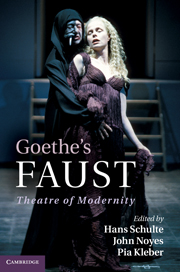Book contents
- Frontmatter
- Contents
- List of illustrations
- List of contributors
- Preface
- List of abbreviations
- Introduction
- PART I MODERNITY
- 1 Faust – today
- 2 Mephisto and the modernization of evil
- 3 Mephisto is the devil – or is he?
- 4 ‘Schwankende Gestalten’: virtuality in Goethe's Faust
- 5 Amnesia and anamnesis in Goethe's Faust
- 6 Magicians of modernity: Cagliostro and Saint-Simon in Goethe's Faust II
- 7 The blind Faust
- 8 From Faust to Harry Potter: discourses of the centaurs
- 9 Mistra and the Peloponnese in Goethe's Faust II
- 10 Goethe and the grotesque: the ‘Classical Walpurgis Night’
- 11 Re-defining classicism: antiquity in Faust II under the sign of the Medusa
- 12 Diabolical entrapment: Mephisto, the angels and the homoerotic in Goethe's Faust II
- PART II THEATRE
- Select bibliography
- Index
- References
7 - The blind Faust
Published online by Cambridge University Press: 01 June 2011
- Frontmatter
- Contents
- List of illustrations
- List of contributors
- Preface
- List of abbreviations
- Introduction
- PART I MODERNITY
- 1 Faust – today
- 2 Mephisto and the modernization of evil
- 3 Mephisto is the devil – or is he?
- 4 ‘Schwankende Gestalten’: virtuality in Goethe's Faust
- 5 Amnesia and anamnesis in Goethe's Faust
- 6 Magicians of modernity: Cagliostro and Saint-Simon in Goethe's Faust II
- 7 The blind Faust
- 8 From Faust to Harry Potter: discourses of the centaurs
- 9 Mistra and the Peloponnese in Goethe's Faust II
- 10 Goethe and the grotesque: the ‘Classical Walpurgis Night’
- 11 Re-defining classicism: antiquity in Faust II under the sign of the Medusa
- 12 Diabolical entrapment: Mephisto, the angels and the homoerotic in Goethe's Faust II
- PART II THEATRE
- Select bibliography
- Index
- References
Summary
Once a play has been written, it is the beginning and end that are least in keeping with life beyond its artistic representation. The author who narrates or brings to the stage the life of various human beings is obliged to provide an artificial beginning and end to his presentation, and the life that unfolds between these two moments derives its particular shape from them.
It is for this reason that Jean Paul in his Vorschule der Ästhetik (para. 74) explicitly calls the first chapter of a novel the ‘Omnipotence Chapter’, in which ‘the sword that cuts through the knot in the last [chapter] actually has to be sharpened’. Thus, by already proclaiming in the ‘Prologue’ the aged Faust's unquenchable thirst for knowledge, and by making this the overall theme with Faust's first appearance on stage, Goethe sets a theatrical world-review in motion that from one phase to another takes in ever more people and ever greater spatial expanses.
The end of a drama – as opposed to all life outside the realm of art – gives the author the opportunity to stop the hands of the clock for one ideal moment, and to take stock of whether or not the main characters, indeed all those involved, have been apportioned the right measure of satisfaction or atonement. Such a stock-taking according to the rules of poetic justice is most clearly seen in comedy when the good are rewarded at the end with marriage or riches or both, and due punishment is meted out to the wicked.
Information
- Type
- Chapter
- Information
- Goethe's FaustTheatre of Modernity, pp. 94 - 112Publisher: Cambridge University PressPrint publication year: 2011
References
Accessibility standard: Unknown
Why this information is here
This section outlines the accessibility features of this content - including support for screen readers, full keyboard navigation and high-contrast display options. This may not be relevant for you.Accessibility Information
- 1
- Cited by
